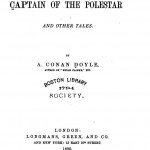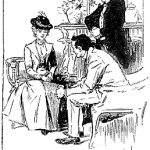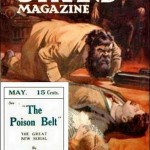“Where do you come from?”
Again no answer.
“He is mad,” one suggested. “Or a foreigner,” said another. “There were no papers on him when he came in. His linen is marked ‘J. H.’ Let us try him in French and German.”
They tested him with as many tongues as they could muster among them, but were compelled at last to give the matter over and to leave their silent patient, still staring up wild-eyed at the whitewashed hospital ceiling.
For many weeks John lay in the hospital, and for many weeks efforts were made to gain some clue as to his antecedents, but in vain. He showed, as the time rolled by, not only by his demeanour, but also by the intelligence with which he began to pick up fragments of sentences, like a clever child learning to talk, that his mind was strong enough in the present, though it was a complete blank as to the past. The man’s memory of his whole life before the fatal blow was entirely and absolutely erased. He neither knew his name, his language, his home, his business, nor anything else. The doctors held learned consultations upon him, and discoursed upon the centre of memory and depressed tables, deranged nerve-cells and cerebral congestions, but all their polysyllables began and ended at the fact that the man’s memory was gone, and that it was beyond the power of science to restore it. During the weary months of his convalescence he picked up reading and writing, but with the return of his strength came no return of his former life. England, Devonshire, Brisport, Mary, Granny—the words brought no recollection to his mind. All was absolute darkness. At last he was discharged, a friendless, tradeless, penniless man, without a past, and with very little to look to in the future. His very name was altered, for it had been necessary to invent one. John Huxford had passed away, and John Hardy took his place among mankind. Here was a strange outcome of a Spanish gentleman’s tobacco-inspired meditations.
John’s case had aroused some discussion and curiosity in Quebec, so that he was not suffered to drift into utter helplessness upon emerging from the hospital. A Scotch manufacturer named M’Kinlay found him a post as porter in his establishment, and for a long time he worked at seven dollars a week at the loading and unloading of vans. In the course of years it was noticed, however, that his memory, however defective as to the past, was extremely reliable and accurate when concerned with anything which had occurred since his accident. From the factory he was promoted into the counting-house, and the year 1835 found him a junior clerk at a salary of L120 a year. Steadily and surely John Hardy fought his way upward from post to post, with his whole heart and mind devoted to the business. In 1840 he was third clerk, in 1845 he was second, and in 1852 he became manager of the whole vast establishment, and second only to Mr. M’Kinlay himself.
There were few who grudged John this rapid advancement, for it was obviously due to neither chance nor favouritism, but entirely to his marvellous powers of application and industry. From early morning until late in the night he laboured hard in the service of his employer, checking, overlooking, superintending, setting an example to all of cheerful devotion to duty. As he rose from one post to another his salary increased, but it caused no alteration in his mode of living, save that it enabled him to be more open-handed to the poor. He signalised his promotion to the managership by a donation of L1000 to the hospital in which he had been treated a quarter of a century before. The remainder of his earnings he allowed to accumulate in the business, drawing a small sum quarterly for his sustenance, and still residing in the humble dwelling which he had occupied when he was a warehouse porter. In spite of his success he was a sad, silent, morose man, solitary in his habits, and possessed always of a vague undefined yearning, a dull feeling of dissatisfaction and of craving which never abandoned him. Often he would strive with his poor crippled brain to pierce the curtain which divided him from the past, and to solve the enigma of his youthful existence, but though he sat many a time by the fire until his head throbbed with his efforts, John Hardy could never recall the least glimpse of John Huxford’s history.
On one occasion he had, in the interests of the firm, to journey to Quebec, and to visit the very cork factory which had tempted him to leave England. Strolling through the workroom with the foreman, John automatically, and without knowing what he was doing, picked up a square piece of the bark, and fashioned it with two or three deft cuts of his penknife into a smooth tapering cork. His companion picked it out of his hand and examined it with the eye of an expert. “This is not the first cork which you have cut by many a hundred, Mr. Hardy,” he remarked. “Indeed you are wrong,” John answered, smiling; “I never cut one before in my life.” “Impossible!” cried the foreman. “Here’s another bit of cork. Try again.” John did his best to repeat the performance, but the brains of the manager interfered with the trained muscles of the corkcutter. The latter had not forgotten their cunning, but they needed to be left to themselves, and not directed by a mind which knew nothing of the matter. Instead of the smooth graceful shape, he could produce nothing but rough-hewn clumsy cylinders. “It must have been chance,” said the foreman, “but I could have sworn that it was the work of an old hand!”
As the years passed John’s smooth English skin had warped and crinkled until he was as brown and as seamed as a walnut. His hair, too, after many years of iron-grey, had finally become as white as the winters of his adopted country. Yet he was a hale and upright old man, and when he at last retired from the manager-ship of the firm with which he had been so long connected, he bore the weight of his seventy years lightly and bravely. He was in the peculiar position himself of not knowing his own age, as it was impossible for him to do more than guess at how old he was at the time of his accident.
The Franco-German War came round, and while the two great rivals were destroying each other, their more peaceful neighbours were quietly ousting them out of their markets and their commerce. Many English ports benefited by this condition of things, but none more than Brisport. It had long ceased to be a fishing village, but was now a large and prosperous town, with a great breakwater in place of the quay on which Mary had stood, and a frontage of terraces and grand hotels where all the grandees of the west country came when they were in need of a change. All these extensions had made Brisport the centre of a busy trade, and her ships found their way into every harbour in the world. Hence it was no wonder, especially in that very busy year of 1870, that several Brisport vessels were lying in the river and alongside the wharves of Quebec.
One day John Hardy, who found time hang a little on his hands since his retirement from business, strolled along by the water’s edge listening to the clanking of the steam winches, and watching the great barrels and cases as they were swung ashore and piled upon the wharf. He had observed the coming in of a great ocean steamer, and having waited until she was safely moored, he was turning away, when a few words fell upon his ear uttered by some one on board a little weather-beaten barque close by him. It was only some commonplace order that was bawled out, but the sound fell upon the old man’s ears with a strange mixture of disuse and familiarity. He stood by the vessel and heard the seamen at their work, all speaking with the same broad, pleasant jingling accent. Why did it send such a thrill through his nerves to listen to it? He sat down upon a coil of rope and pressed his hands to his temples, drinking in the long-forgotten dialect, and trying to piece together in his mind the thousand half-formed nebulous recollections which were surging up in it. Then he rose, and walking along to the stern he read the name of the ship, The Sunlight, Brisport. Brisport! Again that flush and tingle through every nerve. Why was that word and the men’s speech so familiar to him? He walked moodily home, and all night he lay tossing and sleepless, pursuing a shadowy something which was ever within his reach, and yet which ever evaded him.
Early next morning he was up and down on the wharf listening to the talk of the west-country sailors. Every word they spoke seemed to him to revive his memory and bring him nearer to the light. From time to time they paused in their work, and seeing the white-haired stranger sitting so silently and attentively, they laughed at him and broke little jests upon him. And even these jests had a familiar sound to the exile, as they very well might, seeing that they were the same which he had heard in his youth, for no one ever makes a new joke in England. So he sat through the long day, bathing himself in the west-country speech, and waiting for the light to break.
And it happened that when the sailors broke off for their mid-day meal, one of them, either out of curiosity or good nature, came over to the old watcher and greeted him. So John asked him to be seated on a log by his side, and began to put many questions to him about the country from which he came, and the town. All which the man answered glibly enough, for there is nothing in the world that a sailor loves to talk of so much as of his native place, for it pleases him to show that he is no mere wanderer, but that he has a home to receive him whenever he shall choose to settle down to a quiet life. So the seaman prattled away about the Town Hall and the Martello Tower, and the Esplanade, and Pitt Street and the High Street, until his companion suddenly shot out a long eager arm and caught him by the wrist. “Look here, man,” he said, in a low quick whisper. “Answer me truly as you hope for mercy. Are not the streets that run out of the High Street, Fox Street, Caroline Street, and George Street, in the order named?” “They are,” the sailor answered, shrinking away from the wild flashing eyes. And at that moment John’s memory came back to him, and he saw clear and distinct his life as it had been and as it should have been, with every minutest detail traced as in letters of fire. Too stricken to cry out, too stricken to weep, he could only hurry away homewards wildly and aimlessly; hurry as fast as his aged limbs would carry him, as if, poor soul! there were some chance yet of catching up the fifty years which had gone by. Staggering and tremulous he hastened on until a film seemed to gather over his eyes, and throwing his arms into the air with a great cry, “Oh, Mary, Mary! Oh, my lost, lost life!” he fell senseless upon the pavement.
The storm of emotion which had passed through him, and the mental shock which he had undergone, would have sent many a man into a raging fever, but John was too strong-willed and too practical to allow his strength to be wasted at the very time when he needed it most. Within a few days he realised a portion of his property, and starting for New York, caught the first mail steamer to England. Day and night, night and day, he trod the quarter-deck, until the hardy sailors watched the old man with astonishment, and marvelled how any human being could do so much upon so little sleep. It was only by this unceasing exercise, by wearing down his vitality until fatigue brought lethargy, that he could prevent himself from falling into a very frenzy of despair. He hardly dared ask himself what was the object of this wild journey? What did he expect? Would Mary be still alive? She must be a very old woman. If he could but see her and mingle his tears with hers he would be content. Let her only know that it had been no fault of his, and that they had both been victims to the same cruel fate. The cottage was her own, and she had said that she would wait for him there until she heard from him. Poor lass, she had never reckoned on such a wait as this.
At last the Irish lights were sighted and passed, Land’s End lay like a blue fog upon the water, and the great steamer ploughed its way along the bold Cornish coast until it dropped its anchor in Plymouth Bay. John hurried to the railway station, and within a few hours he found himself back once more in his native town, which he had quitted a poor corkcutter, half a century before.




